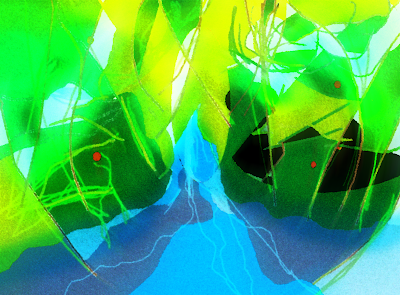One day a man wanders far from his tribe. Deep in the jungle - perhaps half a day's journey from his settlement - he discovers a beautiful fresh water spring. Tired, but excited by his discovery he begins to make the long trek back home to his people. Yet as he walks he has a dilemma:
He wants to tell the rest of the tribe about this amazing discovery he's found, but at the same time he knows that if he tells all the tribe members it's likely that word will spread to neighbouring tribes, and then a neighbouring tribe may come and take control of the spring. Meaning they won't have access to it.
Therefore, thanks to this accidental discovery, he has also discovered a reason for secrecy.
A fresh water spring would be a huge strategic resource for his tribe. What is more essential than fresh water? Surely it's something worth lying for. After all, what is worse? Keeping a secret from some of his fellow tribe members, or allowing a situation to develop where they could go thirsty?
So, as he ponders the issue he finally resolves to go against his first instinct, which was to simply share the truth on his return. Instead, when he returns he doesn't tell everyone about the discovery he's made - he simply goes and tells the tribal elders.
The tribal elders are the leaders of the tribe, and they also keep other secrets. To become a tribal elder and share in these secrets a tribe member must reach a certain age, then go through a series of initiations. One of which requiring a vow not to reveal these secrets to anyone not already initiated -- on pain of death.
Our wanderer, understanding the strategic importance of the new water source he's found, shares his information with the elders; creating for them a map showing the route he took to find the spring. In doing this he helps reinforce the knowledge hierarchy within the tribe, and keeps some of his friends and family members in the dark.
However, he also gives his own tribe a knowledge advantage over the competing tribes that surround them. An advantage that could easily be lost if all the members of the tribe were allowed to share in the knowledge.
Alas, we can clearly see the practical considerations that led our tribesman to choose secrecy over revelation. Likewise we can understand why the tribal elders developed such a system for protecting such secrets in the first place (bizarre though their rituals may seem). For the tribe without a way of protecting their information - be it information about the landscape, stores of food, or battleplans - will be easy prey for the tribes that have one.
So, it appears these systems evolve quite naturally from necessity, no matter how right or wrong we may think they are in principle. It's difficult for any tribe, nation or group to be totally open in a world of threats and dangers.
When there is peace on Earth all people will have access to the spring of knowledge.

